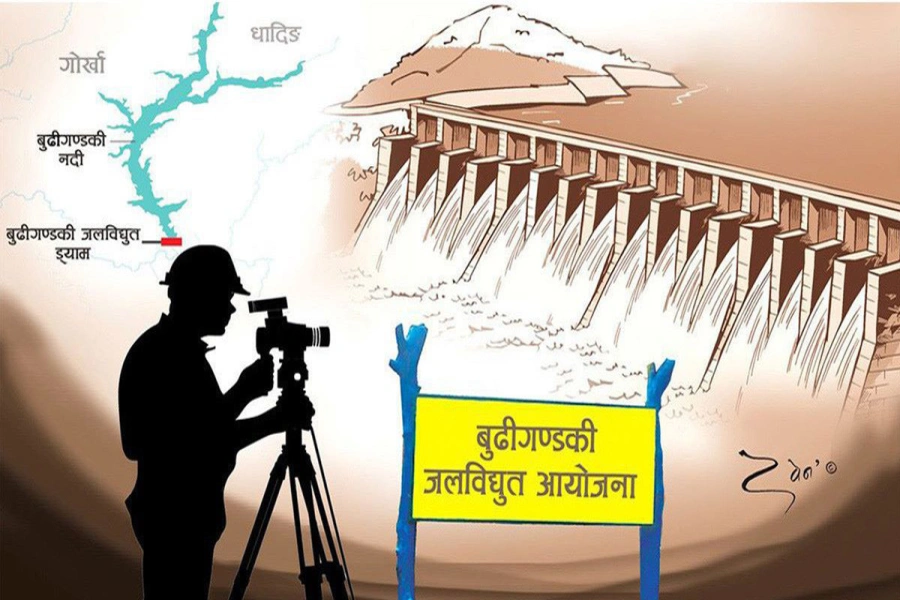KATHMANDU, Nov 14: The Civil Aviation Authority of Nepal (CAAN) has started the upgradation work of Tribhuvan International Airport (TIA). The work is being carried out with the support of the Asian Development Bank at an estimated cost of Rs 15 billion.
CAAN has stated that, according to ICAO standards, the airport is being upgraded by classifying various areas within the airport based on their sensitivity. The project chief, Dipendra Shrestha, reported that the upgradation includes the expansion of the parallel ‘taxiway’ to the southwest, the ‘international apron’ to the north, and the ‘hangar apron’ to the east of the TIA.
The modernization work at the airport has been ongoing for nearly three years, but according to the project chief, Dipendra Shrestha, the next five months will involve work in the airport's most sensitive areas. "The expansion work at the TIA has been underway for three years," he said. "Currently, work is being done on the taxiway, international apron, and hangar apron, which are very sensitive areas."
Shrestha stated that the area within a 75-meter radius on both sides of the runway is highly sensitive, and work is being carried out in this area considering security sensitivities.
Patan Hospital to be upgraded to 1,200 beds at an estimated cos...

Construction equipment cannot be operated while the airport is in operation within a 75-meter radius on both sides of the runway. According to Project Chief Shrestha, since eight new exit taxiways need to be added within the 75-meter area, the construction work is being carried out by closing the airport for 10 hours daily, while work outside the 75-meter zone is underway both day and night.
"Over the next five months, work will be carried out within the 75-meter radius of the runway," he said. "After that, the work in the sensitive areas will be completed, and the airport will remain open at all times."
He also mentioned that after the upgradation, the capacity of the runway will increase by 20 to 25 percent.
Project Chief Shrestha stated that there is no ‘taxiway’ for 500 meters to the north of the runway and for 1,200 meters to the south. Additionally, vehicles from Nepal Oil Corporation are present between the runway and the ‘taxiway,’ causing obstructions on the ‘taxiway’.
Currently, the ‘international apron’ area to the north of the airport has the capacity to park 11 aircraft, both large and small. After the expansion it will have the capacity to park 18 international aircraft, both large and small. Once 18 aircraft can be parked at the apron, the issue of aircraft having to hold in the air will be substantially reduced. Additionally, in the ‘hangar apron’ expansion, a taxiway is being constructed from the runway to the ‘hangar apron’ for aircraft maintenance.
This upgradation project will increase the airport's capacity, specifically enhancing the capacity of the ‘runway’ and the ‘taxiway’. CAAN has stated that this will also make air traffic management easier for air traffic controllers, thereby improving safety as well.
With a significant increase in the number of air travelers, CAAAN is updating the master plan of the TIA and gradually expanding its capacity. In keeping are the development works of a parallel taxiway connecting one end of the runway to the other, international and domestic aircraft parking aprons, and safe hangars for aircraft maintenance.
After this mammoth project, which involves foreign construction companies and consultants, delays in flights and taxiways will be reduced. Similarly, air traffic controllers will be able to manage air traffic more efficiently. Moreover, following the upgradation, the capacity of the runway will increase by 20 to 25 percent, with CAAN aiming to improve the airport's air traffic management.
The old taxiway is only 110 meters away from the runway, but the under-construction parallel taxiway will be located 172.5 meters from the runway, which will comply with ICAO standards. During the ongoing airport upgradation, the airport is operational for only 14 hours a day, leading to a 30 percent reduction in international flights. Regular flights have been affected, and passengers traveling on international flights have been forced to buy tickets at inflated prices due to ticket shortages and collusion among airlines.







































